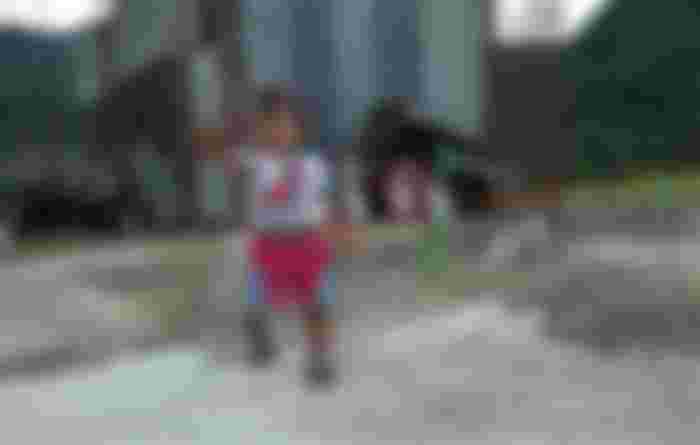How old should an infant starts to walk? What about when you think your child's motor development of walking is late? how to encourage your child to walk when you see the signs he is ready to?
Walking is a major development milestone of a baby during infancy to early toddlerhood. It is one of the milestone a parent/s anticipates with her child's development. This stage comes along with other development such as his communication skill and trying to get along strangers. That's why his body and mind is working on a double. It is a time when you see changes in your lo just like sleeping pattern and whines a lot.
So buckle up, and breath. Things will be fine again once a milestone is achieved.
From rolling over in his stomach and sitting up to crawling, cruising, and finally taking those fist steps have their own pace. Yet he must master those first skills first before able to walk. Don't worry every baby has his own time.
Stages of walking

1. Sitting up. From rolling over, a baby brings his body to a sitting position at around 6 months. The first attempt will make him fall to his side or on his face but because he figured out how to do it, he will get excited and do it over again until he can stay that way.
2.Crawling. Once a baby can sit up, he will try to reach objects across the room on all fours, on his stomach and some with his bottom to move. Some babies don't crawl and some do.
3. Pulling to a stand. As the child is becoming stronger with his workouts of sitting up. His legs can already support his hips to a stand by holding onto furnitures. Then try to make some steps. While you're excited with your child's achievement, so does he. It's because even with numerous falls, he still try to do it again. Encourage him more by saying "up". On average, this takes on during the 10th month.

4. Explore on his own. In a split second your child is on top of the couch standing and ready to nose-dive. This brings you to an adrenaline rush to be on his aid.
This is a stage where their confidence is shining.
As I can remember, it was the time when my daughter hit her nose on the floor at eight months after she climb and tried to stand at the edge of a chair.
A time where you don't want to have your eyes off your child. Because they climb on anything including the stairs.
5.Cruising. It is a stage wherein a baby is holding on to something. He might use a chair which he can push.
He learns to balance himself from shifting his weight from one foot to the other while walking.
Encourage him to put objects on the safe side which he can use, but be sure to use sturdy objects that might not topple and cause an accident.
A safe object to use is an infant musical walking toy with wheels and handles. This encourages a child more to stand and walk.
Traditionally, I just support my baby at his arm or put a blanket around his chest while I hold the end and let him walk. This can be done as early as 6 months as long as you notice enthusiasm in your child while doing. And try to remove the blanket around his chest while he holds the other end and you hold the other.

6. Independently standing. A baby knew when he can balance himself up and have the stability to stand alone. It may only take a few seconds. With your encouragement his confidence will be boosted to stand a little longer.
7. Walking. Finally, after being confident enough to stand, he will try to take that first step. It's a step-step-fall process. Again encourage. When he sees something across the room he wanted to reach and get, he may get down on fours to go get it. But don't worry, it is their initiative to be able to go get it in a faster pace.

The first steps includes a lot of plopping down. It is because he still didn't find how his knees work. And the only thing he can stop is to fall.
First steps take place from 8 to 16 months. While others walk earlier at their first birthday, it doesn't mean a child is a late bloomer when he walks at 14 months. However, when a child is more than 16 months already and cant have that fist step yet, visit his pediatrician.
Factors affecting delayed walking development.
Infant walker- avoid using it as it would only delay your child's from learning the skills such as balance and coordination, standing up and support himself. Besides, walker causes injuries muscle weakening and toe walking.
My youngest child whom I did not use walker walked at 10 months.
Personality. While other babies are eager and confident enough, they are mostly risk-takers. They have a mentality of "I can do all things. " Others wait until they can do well. They're the wait and see type. And grow to be more cautious.
Size. The bigger the baby, the later he walks. Because they need more strength to acquire the skills of walking.
Recurrent ear infection and other illnesses. An ear infection causes delay in walking because the ear controls balance.
Other illnesses may include recurrent hospitalization.
My first born was able to pull himself up at 8 months, and cruise immediately. He made his first step at exactly 1 year old but due to chicken pox and his recurrent confinement at the hospital he was only able to walk independently at 1year and 13 months.
Birth order. Those with older sibling's are encouraged to walk earlier because he wants to keep up with them.
Take into consideration about fashion footwears. Babies who are learning to walk is better off bare footed when inside the house. This allows his feet in direct contact with the floor. Thus, promoting his learning. But when outdoors, make him wear those flexible ones that can be folded at the center.
When you notice the signs of readiness in your child support him through activities that makes him learn the needed skills. Nevertheless, don't push the child to achieve it as it will cause a negative outcome and may delay walking all the more.
related articles:
Speech and communication development
z_graeden




This is the stage where i think the entire house should be wrapped in foam because the kid m8ght get head trauma tbh ;;-;;